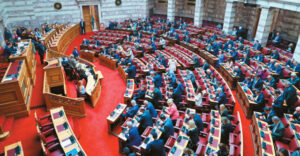Prohibited by intellectual property law is any unlawful use/appropriation of this content in any way, with severe civil and criminal penalties for the violator.
Thoughts on changing the electoral law, with a proposed increase of the entry threshold to Parliament from 3% to 4%-5%, are at the forefront due to the unprecedented fluidity of the political scene. Currently, there are nine Parliamentary Groups, not including the 14 independent MPs and the possibility of a new split in SYRIZA. According to the October polls, which show the continuous shrinkage of SYRIZA’s percentages, conditions are being created for more than ten parties to enter Parliament!
Such a development would lead to a political “patchwork” and the necessity for at least tripartite governments, especially since the second party in the polls, PASOK, has made it clear through its leader that it does not even discuss the scenario of co-governing with Kyriakos Mitsotakis’s New Democracy.
Notably, behind the scenes, movements are already underway to create “opportunistic” parties that could “stick” to any government formation, whether right-leaning or left-leaning: it is telling that reports suggest that Stefanos Kasselakis has declared himself the “Greek Macron,” meaning neither left nor right, in case he fails to prevail in the internal conflict within SYRIZA. On the other hand, Afroditi Latinopoulou, whose party consistently polls above 4%, is persistently attempting to take on the role of the “Greek Meloni.”
In any case, the sharp increase in independencies, defections, and expulsions of MPs over the last 15 months, particularly from the smaller parties, due to the fact that the election of many of them is merely a matter of chance and often occurs with very few votes, is raising significant concerns in the parliamentary background, where informal discussions are intensifying regarding measures to enhance stability and make Parliament more functional.
Concerns
The recipients of these concerns are the Maximos Mansion and the relevant Ministry of Interior, however, Prime Minister Kyriakos Mitsotakis believes that the time has not yet come to open such an issue at this stage, as he considers it more important to achieve consensus to extend postal voting to parliamentary elections. The officials at the Ministry of Interior also appear very cautious about increasing the entry threshold for parties in Parliament, which has been set at 3% and has been in effect uninterrupted since 1993.
In the same vein, electoral analysts consulted by “THEMA” recognize the problems in the democratic functioning of Parliament caused by the intensifying fragmentation of the political forces represented in the current composition of Parliament, but question whether the solution can come from increasing the current threshold. “Who tells us that establishing a 5% threshold won’t push up the performances of smaller formations?” asks one analyst.
The counterargument to these points is that if the 5% threshold had been in place during the fruitless elections of May 2023 (due to the failure to achieve a majority), there would have been no need for the dissolution of Parliament and the call for new elections. This is because New Democracy, which would have benefited from the fact that Kyriakos Velopoulos’s party would not have passed the increased threshold, would instead have 153 MPs in the governing majority rather than 146.
It is worth noting that in most European countries, specifically in 18 of them, such as Germany, Belgium, Estonia, the Czech Republic, and others, the entry threshold for national and often local parliaments is set at 5%. Seven other European states, including Italy, Spain, Albania, and Serbia, have a threshold corresponding to the 3% in our country. The electoral system of the Netherlands has no threshold, allowing for multi-party representation. Meanwhile, in France and the UK, there are no thresholds since majoritarian electoral systems and single-member districts are applied.
“In our electoral system, the dominant issue is not the entry threshold but the bar for achieving a majority, which largely depends on the percentage of parties that remain outside Parliament, according to the logic established by the so-called ‘Skandalidis Law,’ which, with minor variations, applies to all contests over the last two decades,” emphasizes an experienced political figure.
He advocates for a comprehensive reform of the electoral system to establish a fixed percentage above which the leading party will achieve a majority, which will depend solely on its own percentage and not, as is currently the case, on the cumulative percentage gathered by parties that fail to meet the threshold for representation in the next Parliament.
Post-War Record
Nonetheless, no one can overlook the political paradoxes, parliamentary irregularities, and unholy alliances caused by the conditions of increased fluidity that are developing in an already multi-party and heterogeneous Parliament resulting from the 2023 elections.
The pool of independent MPs already counts 14 members from six different Parliamentary Groups (SYRIZA, Spartans, ND, PASOK, Plefsi Eleftherias, Greek Solution). If we add to these the 11 members of SYRIZA who left in November 2023 to form the Coalition of the New Left, it is clear that the Parliament has “produced” 25 MPs in just one and a half years who are currently not affiliated with the parties with which they were elected.
The number of MPs who, whether they like it or not, do not belong to the Parliamentary Groups of the parties with which they ran is a post-transition record, and all signs indicate that it will further increase. A post-war record is also the operation of nine Parliamentary Groups, which is likely to increase as well.
The Dissolution and the Fight Over the Tax ID
The central feeders of the pool of “homeless” or moving members of the National Parliament are SYRIZA and the Spartans. Although they are torn apart by different terms and from different starting points, ultimately their conflict leads to a common denominator: the complete control of the party stamp, funds, and huge state funding. It is characteristic, if not cynical, that Mr. Vasilis Kokkalis (SYRIZA) admitted: “The fight is over the tax ID of SYRIZA.”
The “leaderless” party of the main opposition was elected with 47 MPs but has been left with only 35 and is now openly threatened by PASOK’s 31-member Coalition with losing the significant parliamentary position. The impending new split, due to the fierce internal civil war between the “87” group and the “Kasselakis” faction, is likely to lead to further departures. Already, Alexandros Avlonitis and Petros Pappas have stated that they will become independents if Stefanos Kasselakis is not allowed to participate in the internal party contests.
Other members of the “Kasselakis bloc,” such as Giota Poulou, Rallia Christidou, Theodora Tsakri, and Kyriaki Malama, are also heading in the same direction. If the so-called “concerned” members Elena Akrita, Nina Kasimati, George Gavrilis, Rania Thraskia, Giannis Sarakiotis, and Evangelos Apostolakis join them and meet the required minimum of 10 MPs as stipulated by the Parliamentary Rules, they will have the opportunity to form their own Parliamentary Group.
The Chaos of Independents
In this scenario, Parliament would operate with ten Parliamentary Groups, a corresponding number of leaders, and increased conditions of parliamentary chaos. The chances of creating an 11th Group from the independents appear significantly diminished. Initiatives for self-organization are already being taken among the 14 “homeless” members of the national representation, albeit based on unholy alliances and ulterior motives.
Initially, the initiative for the unification of at least ten independent MPs and the formation of a new Parliamentary Group was taken by Mr. Pavlos Sarakis. The MP from the Greek Solution found a companion in this endeavor in Charis Katsivardas (from Spartans) and began contacts with other “homeless” members, having as a principle the exclusion of all those from the Spartans closely associated with the imprisoned Ilias Kasidiaris. The exclusion filter concerned Konstantinos Floros, the MP who punched a colleague from the Greek Solution, Dionysis Valtogiannis, who is a godfather to the former MP of Golden Dawn, Ilias Barbavroussis, Giannis Dimitrokallis, and Georgios Manousos.
Approaches
Within this framework and given Mr. Lefteris Avgenakis’s public statement that he does not intend to participate in the relevant processes as he wishes to function as an ND MP, the contacts targeted Mario Salma (ND), Athena Linou (SYRIZA), Michalis Chourdakis (Plefsi Eleftherias), Areti Papaioannou (Plefsi Eleftherias), Georgios Aspiotis (Spartans), Michalis Gavyiotakis (Spartans), Burhan Baran (PASOK), and others. However, while Sarakis and Katsivardas were seeking the “golden mean” for cooperation among at least ten diverse personalities—a highly challenging endeavor—there was a contrary move from Mr. Chourdakis.
The expelled member from the party of Zoí Konstantopoulou, along with her mother, Areté Papaioannou, who was also expelled from the party, approached and allied themselves with the four hardliners from the Spartans party, who believe that their participation in this endeavor will alleviate their legal troubles in the voter fraud case. It is worth noting that the Supreme Court has ruled that the real leadership of the Spartans is exercised by Ilías Kasidiáris, who has been convicted in the first instance for directing a criminal organization.
Meanwhile, they secured the support of Ms. Linou and Mr. Salmas, with whom they have a long-standing friendship, and submitted a request for Mr. Chourdakis to represent them at the Conference of Presidents. Ultimately, the appointment of the independent MP to the top parliamentary body lasted for only a few days, as Ms. Linou withdrew her support.
However, information from “THEMA” indicates that the request will be resubmitted next Monday, and likely the signature of Mr. Bourhan Baran will replace that of Ms. Linou. In this way, Mr. Chourdakis will return to the Conference of Presidents of the Parliament as a member, with voting rights on decisions regarding the appointment of members of Independent Authorities and the selection of senior judges.
Ask me anything
Explore related questions





